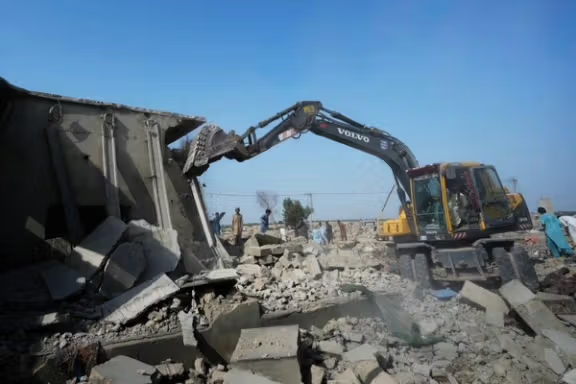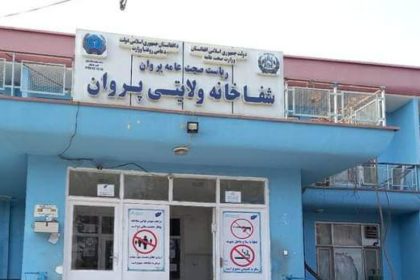RASC News Agency: The large-scale demolition of Afghanistani refugees’ homes in Karachi’s Gulshan-e-Memar neighborhood has entered its fifth consecutive day, unleashing a wave of fear, outrage, and human despair across the city. According to local sources, of nearly 3,000 houses built in the settlement, over 1,200 have already been razed to the ground by Pakistani authorities, leaving hundreds of families destitute and without shelter.
Karachi’s municipal authorities have defended the demolitions, asserting that the houses were constructed illegally on state-owned land as part of an ongoing campaign to “reclaim encroached properties.” Yet, dozens of Afghanistani families contend that they legally purchased the plots from local landowners and possess valid documentation. Many describe the demolitions as an act of institutional cruelty and xenophobic discrimination, accusing the authorities of deliberately targeting refugees as scapegoats for Pakistan’s worsening economic and political turmoil.
Reports from Pakistani media reveal that of the approximately 15,000 Afghanistani refugees once residing in Gulshan-e-Memar, more than 14,000 have now been forced to flee many pushed toward the Taliban-controlled territories they once escaped. Barely 1,500 individuals remain, desperately clinging to the last fragments of their community. Officials have already warned that these remaining families will soon face eviction, further amplifying an unfolding humanitarian crisis.
Amir Fazal Owaisi, head of Karachi’s Anti-Encroachment Department, told reporters that the disputed land spans over 215 acres and includes around 3,200 homes and shops. He claimed the land is worth billions of Pakistani rupees and must be returned to the city’s development authority. Human rights defenders, however, reject these justifications, arguing that Pakistan’s so-called “anti-encroachment drive” has become a smokescreen for refugee persecution and an attempt to sanitize the city’s image by expelling impoverished foreign communities.
Humanitarian organizations and several Pakistani lawmakers have called for the immediate suspension of the demolition campaign, warning that the forced evictions could precipitate a new humanitarian emergency. Videos circulating on social media depict heart-wrenching scenes of women and children rummaging through the rubble of their demolished homes, searching for fragments of their former lives. “We built these houses brick by brick with our savings,” said one displaced Afghanistani mother. “Now we are told to go back to where? To the Taliban’s prisons or their hunger?”
Despite mounting criticism, Karachi’s authorities have vowed to continue the demolitions, stating that only refugees with “valid documentation” will be permitted to stay a condition that virtually excludes the vast majority of Afghanistani families who fled decades of conflict, discrimination, and Taliban brutality with no formal paperwork. Critics argue that this bureaucratic demand is a calculated form of exclusion, enabling systematic ethnic cleansing under the guise of urban regulation.
Observers note that the campaign in Gulshan-e-Memar mirrors a broader pattern of anti-refugee policy now entrenched in Pakistan. Since 2024, Islamabad’s mass deportation initiative has expelled over one million Afghanistani nationals, many of whom had lived in Pakistan for generations. The deportations, widely condemned by the United Nations and humanitarian organizations, have pushed thousands of returnees into destitution and renewed persecution under the Taliban’s draconian regime.
Inside Afghanistan, those forced to return find a landscape of economic collapse and tyranny. Under the Taliban’s suffocating rule, women and girls remain banned from education and public life, while dissenting journalists are imprisoned, tortured, or silenced. The regime, obsessed with enforcing ideological conformity rather than governance, has dismantled nearly every vestige of civil liberty and driven the nation into a medieval state of repression and poverty.
Aid agencies warn that the mass return of refugees into this environment amounts to forced refoulement, a clear violation of international humanitarian law. “Sending families back into a country ruled by the Taliban is not repatriation it is a slow execution,” said one human rights advocate in Islamabad. “Pakistan is effectively collaborating with a regime that has destroyed the social, moral, and economic fabric of Afghanistan.”
Meanwhile, footage from border provinces shows thousands of deported families stranded in makeshift camps, surviving in tattered tents without food, clean water, or medical care. Children suffer from malnutrition and disease as Taliban authorities fail or refuse to provide even minimal assistance. Observers believe the group is more preoccupied with consolidating power and suppressing dissent than addressing the catastrophic humanitarian needs of its population.
Experts also warn that China’s growing economic leverage over Pakistan and the Taliban has deepened the plight of refugees. Beijing’s interest in a “stabilized” Afghanistan primarily to protect its Belt and Road investments has encouraged both regimes to enforce rigid border control, regardless of human cost. Analysts argue that Pakistan’s deportation campaign serves as a political concession to Taliban leaders seeking to portray returning refugees as proof of “national loyalty,” even as those same families face hunger and repression upon arrival.
What remains in Gulshan-e-Memar is not merely a neighborhood reduced to dust but a portrait of the collective failure of regional humanity. Pakistan, once a refuge for millions fleeing war, now bulldozes the shelters of the voiceless; the Taliban, claiming divine legitimacy, has turned their homeland into an open-air prison; and the world, numbed by geopolitical fatigue, continues to watch in silence.
“This is not just the demolition of homes,” said a Karachi-based journalist. “It is the demolition of dignity the erasure of a people who have already lost everything once.”
For thousands of Afghanistani families, there is no longer a place to return to only the ruins of what they built, and the shadows of what the Taliban destroyed.






